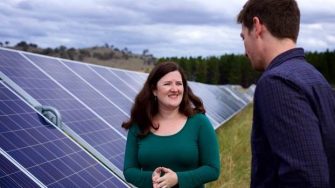
Nicky Ison is a Founding Director of the Community Power Agency (CPA), a Strategist at Climate Action Network Australia (CANA), and a Research Associate at the Institute for Sustainable Futures (ISF) at the University of Technology Sydney (UTS). She is an acknowledged expert and commentator in the fields of energy policy, community energy, new energy business models and the transition away from coal.
Why do you find your work so interesting?
It’s wonderful to have the ability to turn ideas into reality, such as deploying new technologies in ways that benefit local communities. I am also fascinated by the policy side of things and creating policy settings that enable these ideas and technologies to thrive.
I also love working with amazing people who are trying to do good things in the world. It’s personally motivating and stimulating to work on solutions for climate change, the biggest challenge humanity currently faces.
It’s wonderful that you’ve been able to flex your entrepreneurial muscles at the CPA. What does your work there involve?
We’re a social enterprise that works to facilitate a faster transition to clean energy by supporting communities to develop, deliver and benefit from clean energy projects. This could be a community-led solar farm, windfarm or an energy efficiency program.
What about your work at Climate Action Network Australia?
CANA is a network of NGOs working on climate change solutions. I provide strategy advice around what needs to be done to deliver more clean energy, and to make sure that we can more rapidly respond to climate change, particularly in our electricity and broader energy sectors. I find my engineering background really helps provide strategic advice on what is required.
How are you connected to the Institute of Sustainable Futures at UTS?
Before I founded the Community Power Agency I worked as a researcher at the ISF. Now I hold an honorary position as a Research Associate.
Climate change is a difficult space to work in. How do you stay positive about the future?
As an existential threat, I’ve found that if I focus too much on the problem of climate change, it makes me not want to get out of bed in the morning. So, I try always to focus on the solutions and there are plenty of good news stories out there. The global renewables revolution and rapid pace of change is hugely exciting.
When I was an undergrad student, I was really influenced by German politician Hermann Scheer who, through his work on renewable energy, created a picture of society I have worked towards ever since. His decentralised energy solutions not only tackle climate change but create a more democratic society in the process. For a young social democrat, deeply concerned about climate change, that was, and still is, really exciting.
What are the most important skills engineers need to thrive today?
Great technical expertise and communication skills, combined with a commitment to problem-solving and an ability to see the world, not as it is, but how it could be.
What career advice would you give your 13-to-18-year-old self?
Keep going, you’re on the right path! It won’t always be clear, but if you set yourself some goals and be open to the pathways forward, opportunities will emerge.
